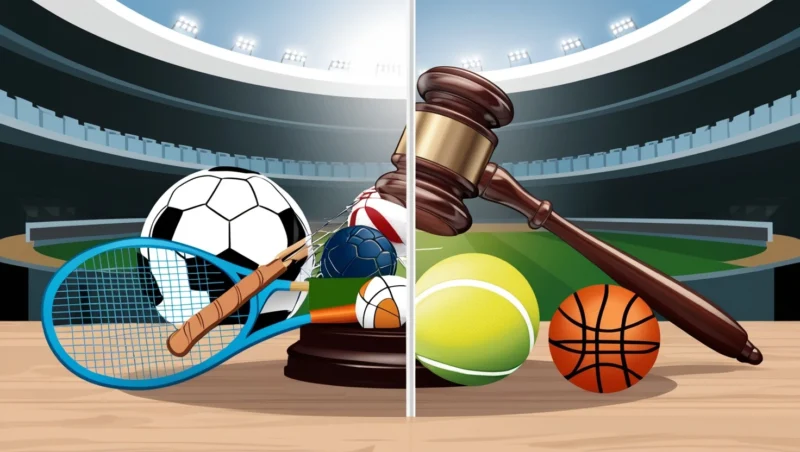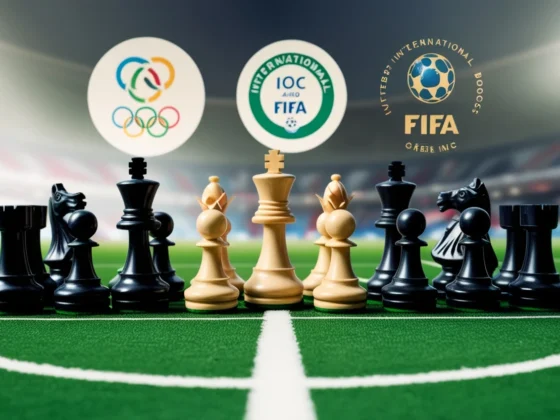Sports and Law, as separate terms are well known to us. Sports Law refers to the laws, regulations, and judicial decisions that govern sports and athletes. It is a dynamic and multifaceted area of legal practice where competitive Sports intersects with various fields of law. Sports Law encompasses all legal matters related to the sports industry. While it is not a distinct legal discipline like criminal or corporate law, it applies established legal principles to issues specific to sports.
This includes:
- Contract Negotiations: Drafting and enforcing player contracts, sponsorship deals, and broadcasting agreements.
- Governance: Ensuring compliance with the rules and regulations of sports governing bodies like FIFA, the NCAA, or the IOC.
- Dispute Resolution: Managing disputes through arbitration or litigation, including cases brought before bodies like the Court of Arbitration for Sport (CAS).
- Intellectual Property: Protecting trademarks, copyrights, and image rights related to teams, events, and athletes.
- Anti-Doping Regulations: Enforcing standards to maintain fair play and integrity in sports.
- Employment Issues: Addressing labor relations, player transfers, and workplace rights in the context of sports organizations.
Changing Times in Sports Arena:
Modern sports are no longer simple pastimes or local competitions—they are multi-billion dollar global ventures with massive audiences, lucrative broadcasting rights, and high stakes sponsorship deals. In this complex ecosystem, the role of governance becomes crucial not only to maintain fair play but also to protect stakeholders, uphold athlete rights, and regulate competition. Traditionally, the world of sports has operated under a self-regulation model. Sporting bodies like the International Olympic Committee (IOC), FIFA, and national federations have maintained autonomy over the rules, discipline, and dispute resolution mechanisms. But the question is—can this traditional system still cope with today’s challenges?
Sports Self-Governance:
The longstanding belief in sports administration has been that “sport should regulate sport.” This philosophy promotes independence from governmental or external interference. However, with the growing commercialization of sports and increasing cases of corruption, doping, and abuse, this model is under intense scrutiny.
Several recent events have exposed the vulnerability of this self-regulated approach and the ongoing need for robust legal aspects of sports:
- Match-fixing allegations against the International Boxing Association (IBA)
- Institutional doping scandals in Russia leading to bans from Olympic participation
- Issues of sexual harassment and exploitation in national federations
- Allegations of vote-buying and corruption at the top levels of sports administration
These incidents point to a serious flaw: self-regulation often lacks transparency, oversight, and legal recourse for victims.
Sports Governance Models:
Globally, institutions like the Court of Arbitration for Sport (CAS) have tried to bridge the gap between autonomy and accountability. But even they are sometimes constrained by the opaque functioning of certain federations. A 2016 article by Glenn Moore identified five major international federations—including the IAAF (now World Athletics), UCI (cycling), ITF (tennis), and IBA—as having deep-rooted governance issues, which he labelled as “red cards” for reform. Furthermore, the World Anti-Doping Agency (WADA) found conclusive evidence of state-sponsored doping in Russia, leading to sweeping suspensions. Despite reforms, questions linger about WADA’s independence and its ability to resist political pressure.
Sports Law in India: Current Realities and Reforms
India’s sports landscape is evolving rapidly, with events like the IPL and ISL bringing a commercial boom. Yet, the governance framework of sports law often lags behind. While the Constitution of India allows for judicial review of national sports bodies, and the Supreme Court has stepped in through landmark judgments, implementation remains inconsistent. Issues like age fraud, inadequate representation of athletes, lack of grievance redressal mechanisms, and poor infrastructure continue to plague Indian sports. In response, the National Sports Development Code of India (2011) was introduced to bring about transparency and efficiency in sports bodies.
Key highlights include:
- Setting term limits for office bearers
- Recognizing the Right to Information (RTI) over national federations
- Guidelines to prevent harassment and abuse in sports
- Ensuring fair selection of athletes for national teams
However, enforcement of these initiatives is patchy, and many federations still operate with minimal accountability.
The Future of Sports Law: Where Do We Go from Here?
To address these systemic issues, a hybrid governance model might be the way forward—where independence is balanced with legal accountability. Governmental frameworks must support athlete welfare, gender equity, and anticorruption efforts while respecting the autonomy of sport.
A few potential reforms in sports law include:
- Statutory recognition of sports federations with clear accountability mechanisms
- Regular independent audits of financial and administrative practices
- Establishment of athlete commissions to protect participant rights
- Stronger whistleblower protections
- Integration of sports law education into legal and sports management curricula
Conclusion: Reform is No Longer Optional
The traditional system of governance in sports, built on self-regulation, has reached an inflection point. As sports evolve into a global commercial phenomenon, governance structures must also mature to reflect transparency, fairness, and legal rigour. At Sports Legal, we believe that law has a crucial role in upholding the soul of sport. Legal intervention is not interference—it’s the key to reform, accountability, and justice in the modern sporting world.
This Blog is written by Saumya Soni, advocate, Supreme Court of India.
For queries or collaborations, write to us at sportslegalorg@gmail.com

